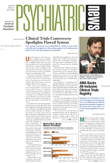The Pediatric Advisory Subcommittee of the Food and Drug Administration (FDA) has advised the agency to require new warning language in the labels of SSRI and SNRI antidepressants and in patient-information materials. The labeling would inform patients that antidepressants taken by pregnant women may result in a newborn experiencing a potentially significant withdrawal syndrome.
“The point here is we've all been talking about giving the information out to the doctors, and that is important, but you also have to give it to the mother,” said subcommittee member Judith O'Fallon, Ph.D., a researcher at the Mayo Clinic.
The FDA nearly always follows the advice of its advisory committees; however, it is not legally bound to do so.
The pediatric subcommittee vote was the result of a June meeting in which postmarketing adverse-event reports were reviewed for a number of drugs, including venlafaxine–extended release (Effexor XR). Under the Pediatric Research Equity Act of 2003, all drug manufacturers must submit data to the FDA on postmarketing adverse events reported in pediatric populations.
In conjunction with the committee's regular review of postmarketing reports of venlafaxine, the subcommittee added consideration of the proposed warning language to its agenda and included a review of all pertinent reports involving antidepressants.
The committee voted to recommend the warning language to the FDA for all serotonin reuptake inhibitors and norepinephrine reuptake inhibitors, even though the agency's data do not conclusively link the medications to fetal toxicity. The agency has received reports of neurological, neuromuscular, and autonomic effects in newborns whose mothers were taking fluoxetine (Prozac), paroxetine (Paxil), citalopram (Celexa), venlafaxine (Effexor), sertraline (Zoloft), and fluvoxamine (Luvox). Infants have exhibited agitation, irritability, trouble feeding, and sleep disturbances that regulators believe could be signs or symptoms of a withdrawal syndrome. In addition, some infants have experienced respiratory distress, cyanosis, apnea, seizures, hypertonia, hyperreflexia, and tremor.
The subcommittee members voted to not issue a public health advisory at this time or recommend that the FDA require antidepressant manufacturers to issue “Dear Healthcare Provider” letters. They were concerned that doing so would scare pregnant women away from treatment, based on what is now only preliminary information. Clearly more research needs to be undertaken, members said, but in the mean-time, they strongly supported physician education as an additional means of communicating the potential risks to newborns.
The subcommittee specifically voted to recommend approval of proposed class labeling for all SSRI/SNRIs within the pregnancy section of the label. The proposed wording states:
“Neonates exposed to SSRI/SNRI antidepressants late in the third trimester have developed AEs [adverse events] requiring prolonged hospitalization, respiratory support, tube feeding. AEs may arise immediately upon delivery.”
In addition, under the dosage and administration section of the labeling, physicians will be advised to taper dosage of the antidepressant during the last trimester so that the fetus receives no drug through the placenta for at least seven to 10 days prior to delivery. ▪
